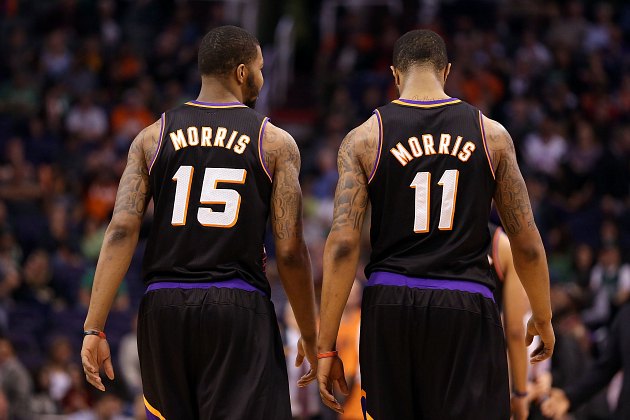
The NBA has featured a fair number of contemporaneous brother players over its history, in large part because these young men have similar genetic codes and grew up in environments that caused them to take basketball and competition very seriously. As a recent ad campaign has taught us, it sometimes takes a separated-at-birth scenario to turn a great athlete's kin away from basketball and toward the high-flying world of insurance.
Given the roughly random dispersal of players via the NBA draft, it figures that brothers would not end up on the same team, and that's mostly been true. Yet one team, the Phoenix Suns, has employed many players with a brother somewhere else in the league. On top of that, they typically get the brother considered less valuable by the majority of scouts.
How does this happen over and over again? In Jeré Longman's New York Times profile of twins Markieff and Marcus Morris, now playing together on the Suns, former general manager Steve Kerr explained the phenomenon (via TBJ):
Since the 2008-9 season, the Suns’ bench has included an unusual number of players with brothers in the N.B.A., including Robin Lopez, a twin of the Nets’ All-Star Brook Lopez; Jarron Collins, a twin of Jason Collins of the Washington Wizards; Taylor Griffin, the older brother of the All-Star forward Blake Griffin of the Los Angeles Clippers; and Luke Zeller, the eldest of three basketball-playing brothers who include Tyler (Cleveland Cavaliers) and Cody (Indiana University). [...]
“If there was a strategy, we should have gone with the better brother each time instead of the worse brother,” Steve Kerr, a former Suns general manager, said with a laugh. “It’s just total coincidence. More than anything, it’s a sign of how good the Suns have been over the years. They were never in position to draft the more accomplished brother.”
Well, that makes some sense, especially considering the Suns were unable to select the superior brother in each case (except Markieff, who went one pick before Marcus in the 2011 draft). However, the article provides a detail that suggests Kerr is not being entirely honest:
Markieff seemed to lack hustle and concentration with the Suns, Angel Morris said of her older, by seven minutes, twin. And Markieff also seemed to grow despondent after Marcus, who played little in Houston, was demoted to the N.B.A.’s Development League.
“They said ’Kieff hit a rookie wall," Angel Morris said. “I don’t think it was a rookie wall. I just think that when they sent Marcus to the D-League, he was so depressed that ’Kieff felt the same depression.”
Marcus, she said, “didn’t want to be bothered, didn’t want to talk on the phone, was just in another world.”
Now the "coincidence" suddenly makes sense. By selecting the weaker brother, the Suns are banking on the fact that two players who have been together their entire lives will struggle without each other. Then, when the better brother finds trouble, he can be acquired more easily, with the added bonus that they will appear to be the most obvious destination on the market. Although this plan didn't work (or hasn't worked) with the Lopezes, Griffins, and Zellers, Phoenix's patience paid off with the Morris twins. What a steal!
Obviously this is a market inefficiency, and the Suns are smart to exploit it. While the 2013 NBA draft isn't considered a particularly good one, Phoenix has a chance to nab some top prospects down the line. Sure, we don't know a lot about Nerlens Noel's brother Stevie now, but just imagine the splash the Suns can make in 2016.
No comments:
Post a Comment